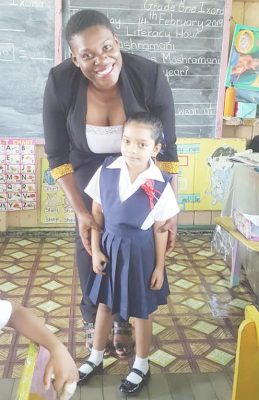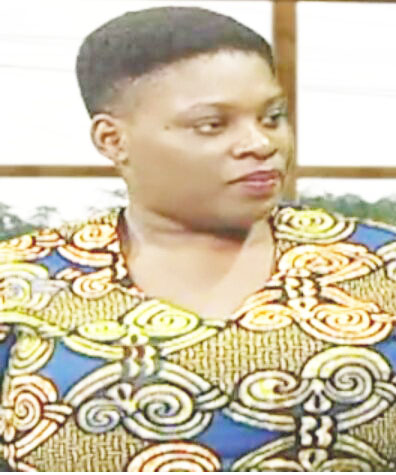A simple thank you from the mother of a patient who took her own life was enough to drive young Dr Colleen Bovell to branch off into clinical psychiatry; the gratitude from that mother was because Bovell had treated her daughter humanely, when everyone else had written her off.
“… She had taken gramoxone. She came into the medical ward, she spent a few days, but she went home and she died. I did not know this… [until] … her mother came to me and said, ‘Doc, I came to thank you. My daughter died.’ … She said, ‘You were the only person who treated my daughter with dignity. You showed her so much care, so much love, no other doctor or nurse did that.’ And she said because of that she can stand strong because she was at the point of taking her own life,” Dr Bovell told the Sunday Stabroek in a recent interview.
Mental health had always held her interest, especially when she was in medical school and had to rotate in the various areas, but it was this incident that made her move into the area.

And so, since 2016, she has been working in the area of psychiatry and according to her she loves her job, but she wants to see more done for persons with mental illness and believes that everyone can be involved even if it is just saying a kind word or bringing a neighbour to seek help.
“I am big on changing the face of mental health one conversation at a time and I hope the conversation becomes normal one in every home…,” she said.
While on any given clinic day the doctors and nurses of the Psychiatry Department of the Georgetown Public Hospital can see up to 100 patients, Bovell said she does not allow the work to overwhelm her, as helping a patient is helping a family and if a family is helped a community is helped and by extension the nation is helped.
“I realised the care needed for mental health because everyone pays attention to physical health and think you can walk around with mental health but there is no health without mental health,” she later said, referencing the encounter she had with patient’s mother.
Upon request, she worked at the National Psychiatric Hospital for one year and started her residency in 2017 in psychiatry.
She shared that many times patients who attempt to take their lives visit the hospital and no one pays attention to their mental health and at times they would even be told, ‘You want dead that is why you drink it.’
“But nobody tries to look at social situations, look at the emotional, psychological, nobody tries to examine that,” she said.
Bovell, who studied medicine in Cuba and completed all aspects of it in 2013, said she does not regret making that move to psychiatry and hopes that more persons see the need to join the profession and do so sincerely.
“Some people do things and they don’t have a love for it, maybe for the benefit they can get… But it is something that I love. I am often pleased when you can take people out a dark hole…,” the psychiatrist said.
When someone tells her, ‘Doc if it wasn’t for you, I would not have been alive today,’ it acts as motivation to Dr Bovell especially when the person was not administered any medication, but she just sat and listened to them.
Talk a lot
Dr Bovell disclosed that she talks a lot with her patients and their families as it is important that they are educated. There are times when there is need for medication, but doctors use their judgement on whether it is needed.
“And you just don’t shove the tablet because it has side effects. They need to know the possible side effects… And you have to make the decision depending on the pathology they have,’ the mother of two said.
However, she did point out that persons with psychotic disorders often lose touch with reality and many times they are unable to understand that they are ill, and it is in these cases that the information has to be relayed to the family. The follow-up with the patients is almost immediate as it is important that doctors know the progress of their patients.
“You have to make your clinical judgement, there is no one size fit all,” she pointed out adding that there are many cases where medication is not administered.
The department’s clinic days for adults are on Mondays, Wednesdays and Thursdays and children are seen on Tuesdays but along with that the doctors have satellite clinics around the country where they are assigned.
On an adult clinic day, the department sees roughly 100 patients. It is staffed with two Cuban consultants, Head of the department Dr Bhiro Harry, and five residents. Medical students are rotated to the department and the hospital’s neurologist also assists in the treatment of patients.
According to Dr Bovell, the department also see a number of children and those are the ones whose parents are willing to bring them. Some of the children have to be placed on medication and she made the point that they don’t work alone but work along with the neurologist and there is also the social worker as many times the social lives of the patients have to be investigated.
As it relates to the pathologies that they see in children, Dr Bovell said some children were born with developmental disorders but there are those who develop certain psychiatric pathologies as a result of severe social neglect, which is a risk factor for many children. There are those children as well who lost their parents and “bounced from home to home” and while many think children do not have problems, there are teenagers who are depressed. Anxiety is also common in the children seen.
“Each case is unique, and we treat them like that because everybody’s story is not going to be the same,” she noted.
Balanced life
In the years she has been there, Dr Bovell said, she has had a few bizarre encounters, like the day a male patient attempted to grab her breast, but she said as doctors they always have to be vigilant and she was able to avoid the encounter. There are also the cases where patients who she felt was making progress, suddenly commit suicide. One such was that of a young man who always requested to see her. She recalled that she she had her if he was feel suicidal and he responded in the negative. A few days after that encounter she learnt he died as a result of hanging.
Bovell reiterated the importance of a balanced life for both children and adults and advocated that a holistic approach should be taken. She noted that at times parents just see the grades of their children as being important not recognising that they also have to check their children emotionally.
“They have to deal with their psychological aspect, physical aspect, their social life, their spiritual life; all that is important when you take a holistic approach,” she pointed out.
She admonished that parents have to do their work at home and not wait to get help outside of the home, but she pointed out that there are times when patients are not fully aware of their roles and that is why the department takes the holistic approach and tries to involve everyone when treating patients.
Bovell said she is always saddened when professionals who should know better make fun of mental health
“For me it is not funny because I am in the field and I love my patients and because I have spent so many years in this work… and I know they are normal persons like everybody else I sometimes I get offended,” she said.
There were times when she called out persons, even family members, who make fun or make inappropriate posts about mental health on social media.
“When you laugh, and you put funny names to it and make jokes out of it, you help to increase stigma because persons would not want to seek treatment. But they need to understand that mental illness has no status, no race, no gender, no age. Anyone can become mentally ill,” she said.
A life outside of medicine
Asked what keeps her going, as she is also a mother and a wife, Dr Bovell said she ensures that she is involved on activities outside of medicine.
She recalled that while being trained to be a doctor, she heard the quote: ‘A doctor who only knows medicine does not even know medicine’, but it was only after she completed her studies and started to work that she understood what it meant.
“It gets stressful if you do not have a life outside of medicine, so I have a life outside of medicine,” she said stressed.
Dr Bovell shared that she is a co-author in the book Women Across Borders 2019 Ontology and last year she was the first-runner up in the Miss Emancipation Queen pageant. Dr Bovell is also the owner of My Melanin Creations which she started after the pageant, motivated by the International Decade for People of African Descent being observed from 2015 to 2024 which has as part of its theme, recognition justice and development. She started My Melanin Creations as part of raising awareness for African culture and history. She also has a Facebook page under Dr. Bovell’s Mental Health Corner which she uses to raise awareness.
“I love people and I volunteer. I volunteer with Step by Step Foundation for children with autism spectrum disorder, I volunteer with Suicide and Violence Eradication Guyana. I love volunteering so I love to get myself out there…” Dr Bovell said.
She said everything she does she loves and has a passion for, “and if it crosses into my work that is because I love my work.”
Later this year, she will represent Guyana in the Women’s Delivery Conference in Vancouver, Canada. “So, I have this whole life outside of what I am doing and sometimes people would see me and ask ‘you sure you are a doctor? How does this relate to what you are doing?’”
She also spends a lot of time with her family as she has a 3-year-old and a four-year-old children. Her daughter will be at Carifesta with her music class and Bovell said she will be on the trip.
“No, no there is no stress when I leave here,” she said.
However, she said persons need to look at the care of mental health workers and not just the patients and sometimes just ask them ‘how was your day’.
“We need care too because this can become overwhelming…,” she said.










